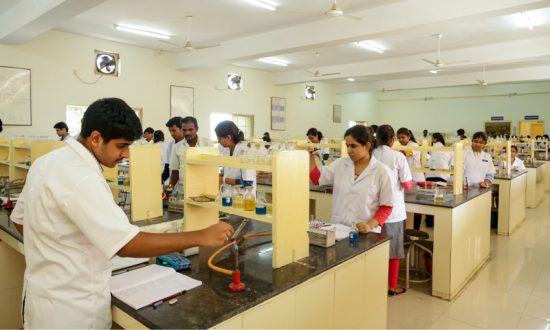The impact of COVID-19 on Adichunchanagiri Institute of Medical Sciences (AIMS) located in Mandya District of Karnataka was bifold. One was to serve the community by continuing to provide quality health care to patients and to protect them and the health care workers from getting infected by possible suspect cases of COVID-19. On the other hand, to effectively deliver the curriculum to more than 650 undergraduate students and around 90 postgraduate students spread across the country.
“Precautionary measures were initiated early to ensure the safety of the patients and health care workers. The guidelines laid down by the authorities were completely adhered to. Various measures like securing the entry and exit points of the hospital, thermal scanning, starting of fever clinics, the establishment of sample collection centre, dedicating beds to COVID-19 cases and procuring of high-quality PPEs to protect the workforce were initiated,” shares Dr M. G. Shivaramu, Principal & Professor of Forensic Medicine, Adichunchanagiri Institute of Medical Sciences. It was impressive to see that the institute establishing a dedicated RT PCR virology lab for running diagnosis of COVID-19 cases within a short span of 15 days, spending over one crore rupees. Adichunchanagiri Hospital and Research Centre (AHRC) is now designated as a Dedicated COVID Health Center by the Government of Karnataka.
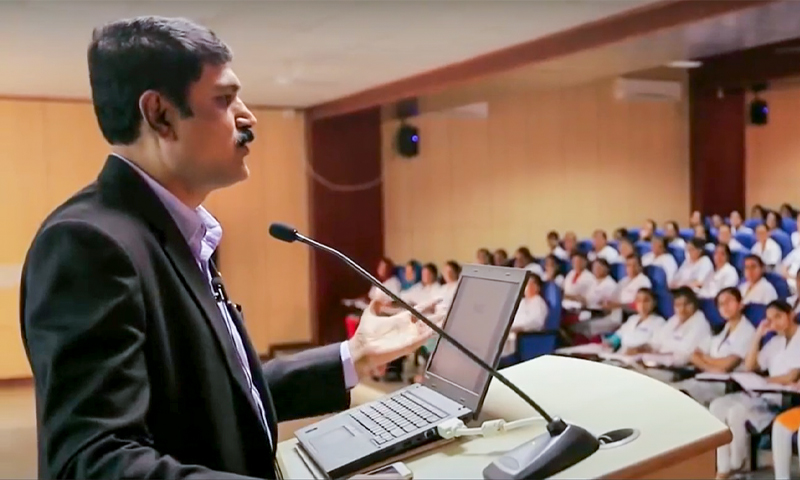
However, the teaching-learning process at AIMS continues despite the ongoing challenges. “Addressing the curriculum delivery began with asynchronous teaching sessions to allow the students to make a transition from face to face learning. Meantime the faculty were trained in preparing quality educational resource materials for the students and in conducting live/synchronous teaching-learning sessions,” says Dr Shivaramu. Over the last three months, AIMS has conducted about 650 teaching sessions for undergraduate students and around 40 national and international webinars for the benefit of our faculty and students. Dr Shivaramu adds, “These sessions have been challenging initially for both faculty and the students. But with time, both have mastered the process of effective online learning.”
AIMS was started in the year 1986 under the stewardship of Paramapoojya Jagadguru Padmabhushana Sri Sri Sri Dr Balagangadharanatha Mahaswamiji, who was also the President of the Sri Adichunchanagiri Shikshana Trust (R). Since 1986, AIMS has been imparting education in medical sciences (MBBS, MD/MS, Diploma) course. The institute is recognized by the Medical Council of India, General Medical Council, London, UK and was earlier affiliated to the Rajiv Gandhi University of Health Sciences, Karnataka. Now it is a constituent college of Adichunchanagiri University. The University is currently guided by the honourable Chancellor Paramapoojya Jagadguru Sri Sri Sri Dr Nirmalanandantha Mahaswamiji. The vision of the institution is to be a centre of excellence with an emphasis on socially meaningful medical education, research, and healthcare.
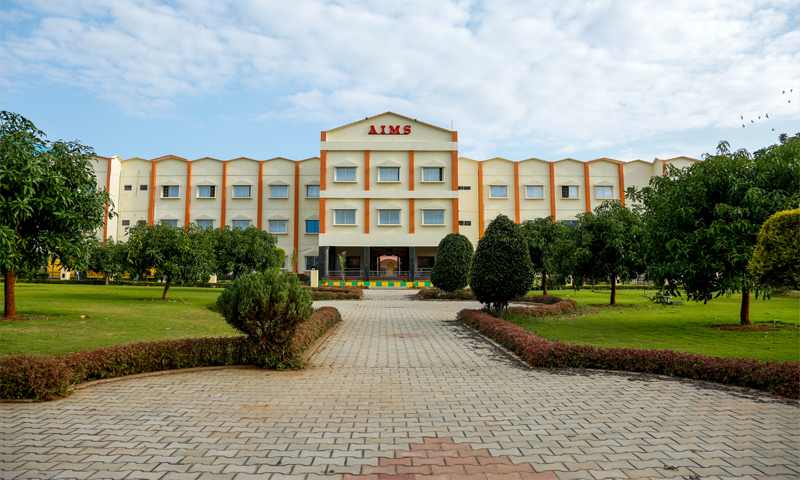
Being a Frontrunner in Fighting the Pandemic
Since the first case reported in India, Adichunchanagiri Hospital and Research Centre (AHRC) has been on high alert, and they have taken several measures to face COVID 19. “We started the fever clinic according to MOHFW guidelines and ensured the initiation of thermal screening and regular reporting of ILI AND SARI cases to the state government was done daily,” shares Dr Shivaramu. AHRC was actively a recognized COVID 19 SAMPLE COLLECTION centre by the District Health Authorities. A team consisting of Clinician, Microbiologist and Lab Technician were involved in the safe collection of samples following an SOP that was developed according to ICMR guidelines. The hospital also conducted training to define the role and responsibilities of each team member. Dr Shivaramu adds, “A kiosk was developed to protect the Health Care Workers during the sample collection. PPEs were provided according to ICMR guidelines for sample collection. Environmental sanitation was done after each individual sample collection.” AHRC was actively involved in the sample collection of migrant workers. A team was formed to collect the sample in Mobile sample collection vehicle at the quarantine centre and District Security Check Post.
A series of measures have been taken by AHRC in managing the COVID 19 cases. “In recognition of our efforts and availability of facilities in our hospital, AHRC has been designated as Dedicated COVID Health Centre (DCHC) by Government of Karnataka. We have designated a separate block in our hospital with separate entry and exit to cater to the needs of COVID Positive cases. We have allocated separate areas for both suspected and confirmed cases,” explains Dr Shivaramu. All the beds in AHRC COVID 19 block have assured oxygen support. AHRC has the maximum number of well-equipped advanced Ventilators in Mandya District to provide the services for severe cases which require ventilator support. The hospital has a dedicated team of Intensivist, Anesthesiologist, Physician, Nursing and Paramedical staff available for providing the services.
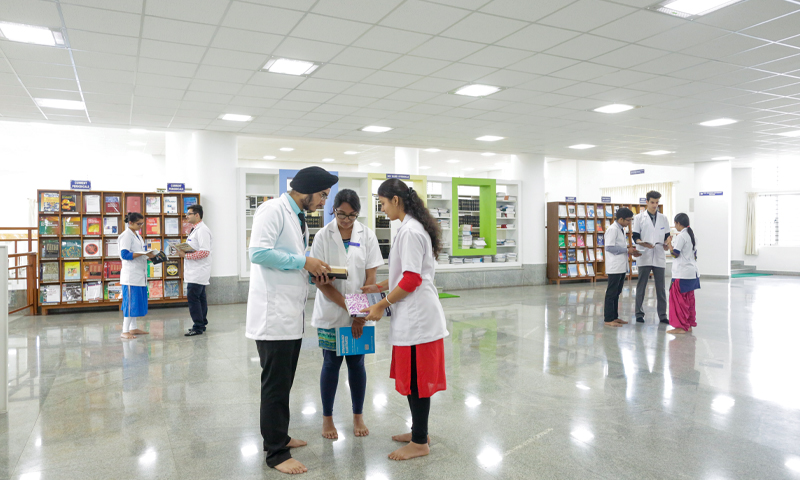
“We have also dedicated a Basic Life Support Ambulance (BLSA) equipped with sufficient oxygen support for ensuring safe transport of a COVID 19 cases. We have also arranged for separate dedicated COVID 19 labour room and Caesarean Section Operation Theatre to provide the maternal and Child Health Care for the surrounding population,” shares Dr Shivaramu. AHRC has never compromised in providing the safety of HCWs in the battle to fight COVID-19. The hospital has taken all measures in protecting their HCWs in the line of treatment. “We have followed the ICMR/WHO guidelines in providing the protection gears to all the staff-Doctors, Nursing staff, Paramedical staff, Security personnel, Ambulance drivers, Cleaning staff and Helpers. Regular classes were conducted to demonstrate how to use masks and donning and doffing of PPE. Strict environmental sanitation measures were followed in the patient treatment area to break the chain of COVID 19 transmission,” says Dr Shivaramu.
Being a Research-Oriented Medical Institute
AIMS has a well-defined research promotion policy and has fully active scientific and institutional ethics committee which monitor and guide the research activities. The institution has set aside an exclusive budget for encouraging research activities by faculty and students. “In the last five years, we have published more than 700 research papers in peer-reviewed national and international journals and have carried out 50 student research projects under the sponsorship of Indian Council of Medical Research (ICMR),” shares Dr Shivaramu.
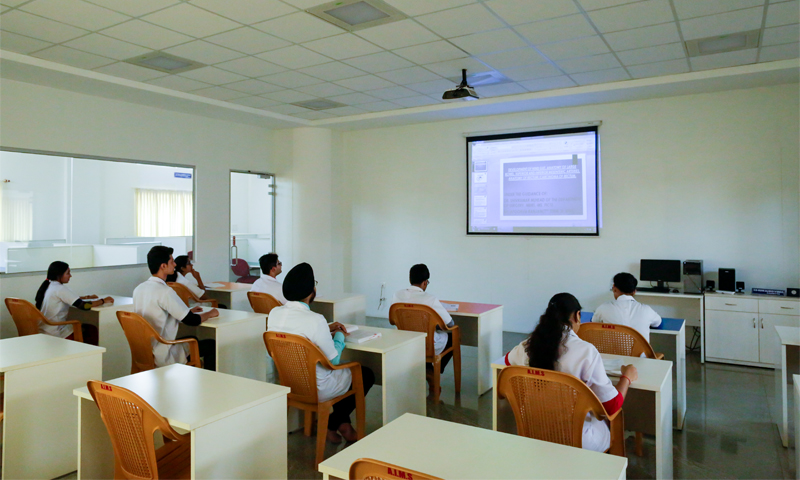
AIMS publishes Journal of Medical Sciences and Health (JMSH), an indexed, peer-reviewed International open access Journal with print and online version. The journal is into the 5th year of publication and provides a common forum where all aspects of Medical, Clinical and Health Sciences research can be published. Dr Shivaramu adds, “The journal is indexed with DOAJ (Directory of Open Access Journals), Index Copernicus, Advance Sciences Index (ASI), Google Scholar, International scientific indexing, Index Medicus ( Global and SEAR database), Infobase Index, National Science Library and Open J Gate.” Current research projects of AIMS aim at, studying social/academic/economic impact of COVID-19 on the students and community; studying complications of extubation; quality of life among end-stage renal disorders patients; comparison of different methods of cholesterol estimation; ocular morbidity, glaucoma, eye donation and acute appendicitis.
To augment its research capacity and improve the overall quality of medical education, AIMS has been actively collaborating with international institutions. “Global partnership provides great opportunities for students and faculty to form networking which is essential for career progression. These can be research opportunities, cultural awareness, study abroad programme, student and staff exchange programmes and collaboration with other universities for awarding degrees,” opines Dr Shivaramu. AIMS has an association with Rotaplast International, Inc., an organization which is committed to helping children and families worldwide by eliminating the burden of cleft lip and/or palate, burn scarring, and other deformities. In association with Rotaplast International, the institute organizes cleft lip and cleft palate surgery camp every year. Dr Shivaramu adds, “Hundreds of underprivileged from the rural community are benefited by this programme. A team of surgeons from the United States visits AIMS every year to conduct these surgeries. This provides a great opportunity for our students and faculty to interact and train with clinicians from abroad.” The institute has been conducting camps from last decade, and more than 1000+ patients/children have been benefitted.
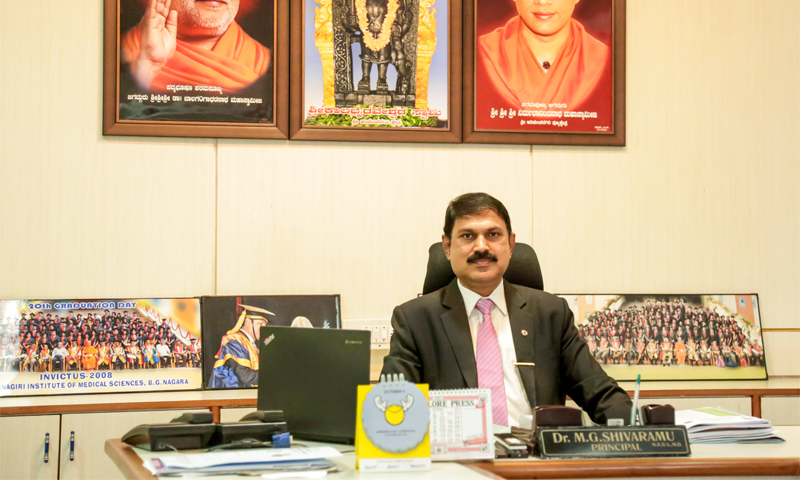
AIMS is also associated with the Medical Students Association of India (MSAI) and the International Federation of Medical Students Association (IFMSA). MSAI is an organization, which strives to provide its medical students with numerous opportunities to become global health leaders of today and tomorrow. The International Federation of Medical Students’ Associations (IFMSA), founded in 1951, is one of the world’s oldest and largest student-run organizations. It represents, connects, and engages every day with medical students from 135 NMOs in 125 countries around the globe. IFMSA offers a Professional Exchange program under The Standing Committee on Professional Exchange (SCOPE). SCOPE is a full educational program offering clerkships to medical students abroad. AIMS is a SCOPE active institution in India.
State-of-the-Art Infrastructure
AIMS is housed in a unitary Wi-Fi enabled campus of about 48.22 acres of unpolluted and pristine surroundings near its teaching hospital with plenty of room for future expansion. All buildings are spacious from within while their exteriors are aesthetically designed. The College complex features large, digitally-enabled Theater Classrooms, Lecture Rooms, Laboratories, R & D Center, an Anatomy Museum, the Administration Block, and an Open-Air Stage in its Central Courtyard. The campus also features an elegant Residency complex for students, a Food Court and ATM facilities.
The aesthetically built centrally air-conditioned Auditorium is AIMS’ pride-of-place with towering columns and majestic steps that lead into a hall of 2000 seating capacity complete with a professionally designed stage fitted with motorized screens and a sophisticated sound and light system. At the ground level of this magnificent edifice is a state-of-the-art, centrally air-conditioned Learning Resource Center featuring the latest volumes of medical literature, a Digital Classroom and vast study areas.
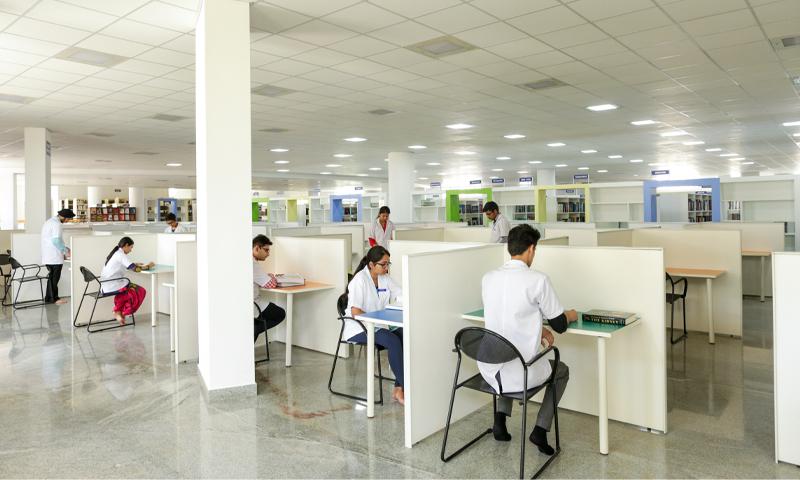
“Adichunchanagiri Hospital and Research Center (AHRC) was commissioned in 1990 to render affordable healthcare services to the poor and the needy. Today, the hospital provides priceless teaching and training ground for AIMS Undergraduates and Postgraduates who benefit from the experiences of renowned doctors. To study at AIMS, therefore, is a matter of active learning in an atmosphere of intense intellectual excitement,” pinpoints Dr Shivaramu. The programmes offered here include assessed clinical experiences, an essential component of academics, supported by purpose-built facilities and technology, designed to replicate real-life situations. Advanced coursework is informational and enriched by hands-on learning from mentors who push the boundaries of knowledge.
AHRC has 1050 beds under one roof with a built-up area of 33151 sq. The hospital has state-of-the-art infrastructure and the most advanced equipment. It is a tertiary hospital and is dedicated to serving the poor and downtrodden with affordable and quality healthcare. The hospital also offers round the clock diagnostic services in Virology, Hematology, Biochemistry, Clinical Pathology, Cytology and Histopathology, Microbiology & Serology, RadiodiagnosisRadiodiagnosis & Imaging and Immunology.
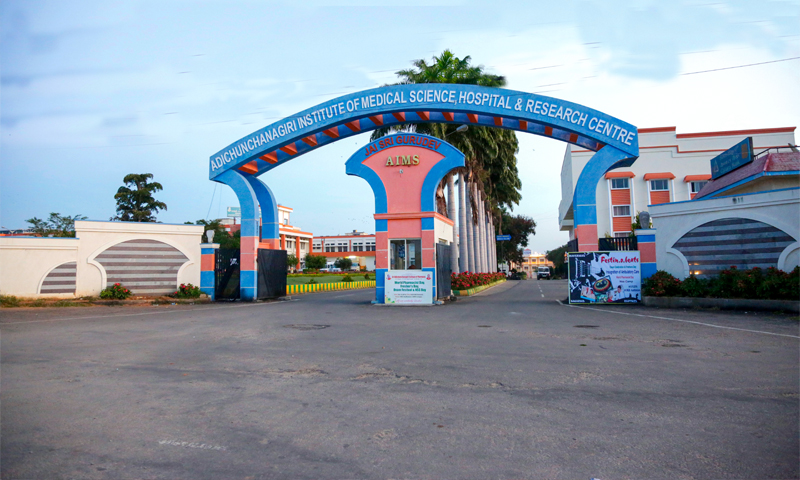
All hospital clinical departments are supported by 24×7 services like in house Central Sterile and Supplies Department, in house Hospital Laundry, Drug Stores, Medical Gases, Security, Ambulance Services, Medical Record Department, Hospital Management Information System, Mortuary, Dietetics, Cafeteria, Public Relations and Telecommunications, Medico-Social Welfare Department, Voluntary Services (Helping Hand) and Clinical Trial Management Services. The hospital is geared to provide excellent service in multi-disciplinary ICU, Surgical ICU, Isolation ICU, Pediatric ICU, Neonatal ICU, Cardiac ICU, Respiratory ICU, Renal ICU, Transplant ICU and Cardiothoracic ICU. These specialized intensive care units are specially staffed and equipped to provide the highest level of care to patients.
Achieving High Academic Excellence
Students of AIMS have always made the institution proud by achieving academic excellence. Dr Shivaramu proudly says, “In the last 5 years, our undergraduate students have secured 15 ranks, and postgraduate students have secured 37 ranks under Rajiv Gandhi University of Health Sciences. Our students have also excelled in the field of research.” Over the last 5 years, 50 research proposals have been accepted by the Indian Council of Medical Research (ICMR) under the short-term studentship programme (ICMR-STS), 4 research proposal under student research grants of Rajiv Gandhi University of Health Sciences and 18 research projects under Adichunchanagiri University. Recently a batch of AIMS students has been selected under standing committee on Professional Exchange (SCOPE) under the International Federation of Medical Students Associations (IFMSA).
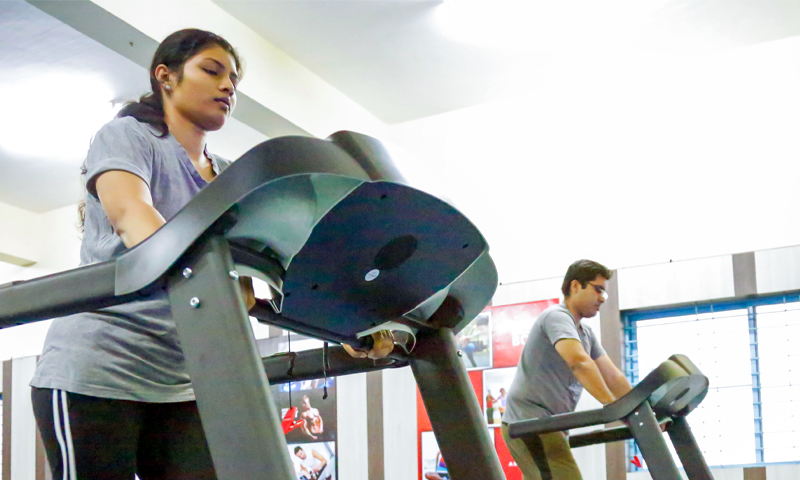
“The teaching faculty at AIMS is a unique blend of youth and the experienced. As on today, we have a workforce of 178 teaching faculty who are involved in providing health care to patients and medical education of global standards to the undergraduate and postgraduate students,” pinpoints Dr Shivaramu. AIMS has a well-established medical education unit (MEU) within the campus which provides training for the faculty in medical education technologies. Over 60 per cent of AIMS faculty members are trained in the Medical Council of India recognized, Revised Basic Medical Education Technology programme. The MEU conducts regular faculty development programs for training the faculty to keep them updated in the field of medical education and to help them in the process of effective curriculum design and implementation.
With such highly qualified faculty members, AIMS practices a unique mentorship programme, wherein a faculty in each phase/year mentors about 10 students. The mentors provide help to the first-year students in understanding the challenges and opportunities present in the college and allow a smooth transition to campus life. “They also counsel academically weak undergraduate students and play an important role in helping them cope with academic and extra-academic problems,” pinpoints Dr Shivaramu. Mentors provide the opportunity for interaction with positive role models, alumni and allow for great networking. They also identify problems of the students and bring them to the notice of the concerned authorities.
“Our students have been outstanding even in extracurricular activities. They have brought laurels to the institution in sports and cultural activities at various University, State and National level,” shares Dr Shivaramu. In fact, apart from the regular academic activities AIMS believes in the holistic development of the students. Dr Shivaramu adds, “We have regular cultural activities through various committees, including Sports and Cultural Committee, NSS, YRC and so on.”
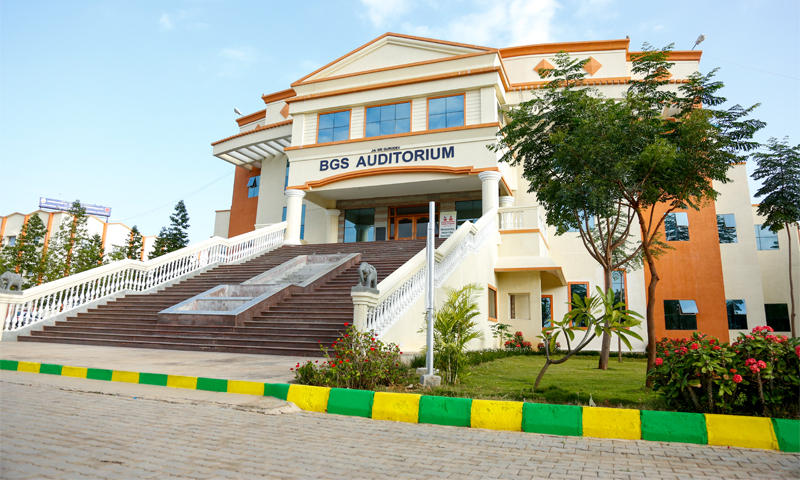
In a nutshell, every aspirant who is willing to get admitted to AIMS should not only meet the eligibility requirements as set by the Government of India but is also expected to have qualities like discipline, compassion and empathy, responsibility, humility and should have a sense of duty, service and social responsibility. Indeed, the goal of AIMS resonates with the attributes of an Indian Medical Graduate as defined by the Medical Council of India. A student after graduating from AIMS will be ready to undertake the responsibilities of a primary care physician/doctor of the first contact who can provide preventive, promotive, curative, palliative, and holistic care with compassion. “He/She will be a “five-star doctor,” possessing the ability to fulfil roles of a clinician, a leader, a communicator, a professional and a lifelong learning learner,” states Dr Shivaramu.
Today, AIMS has many ambitious plans. “Our immediate plans are to ensure the safety and safeguard the interest of the students, community and our workforce. All measures are being taken to ensure best practices in online teaching, learning and assessment are implemented,” shares Dr Shivaramu. The COVID-19 RT PCR virology lab will serve the community by providing timely diagnosis and management of COVID-19 cases. “Safety of our workforce will continue to be of paramount importance to us, and all measures will be taken to ensure the same,” adds Dr Shivaramu. At the same time, AIMS is also progressing rapidly towards enhancing the undergraduate admissions to 250 and completing a new multi-super speciality hospital block, starting of new DM/MCH courses, enhancing existing MD/MS seats to 150. “AIMS will strive towards becoming a centre of excellence with emphasis on socially meaningful medical education, research and healthcare,” concludes Dr Shivaramu.




